A powerful tropical cyclone yesterday battered the South Pacific island nation of Fiji, witnesses said, destroying buildings and causing injuries in the capital, Suva, pressuring a population already bracing for the COVID-19 outbreak.
Cyclone Harold, its strength ranked in the highest category of five, passed over Fiji’s south at about midday, leveling homes and snapping communications links in the archipelago, which has adopted curbs on movement to rein in the virus.
“We’ve seen reports of injuries,” Fijian National Disaster Management Office Director Vasiti Soko said by telephone. “As to the number, as well as the intensity, of the injuries, that’s yet to be ascertained.”
There were no immediate reports of deaths, but about 10 houses in Suva were reported destroyed, Soko added.
Flooded streets, wild winds and ruined buildings on the country’s main island home to Suva featured in unverified video images and photographs circulated on social media.
Emergency officials were scrambling to establish contact with the southern island of Kapavu, after the storm severed communications with it, Soko added.
The ferocious storm has cut a path through the Pacific, which is already on high alert for an outbreak of the coronavirus.
Although Fiji has just 15 infections and no deaths, Fijian Prime Minister Frank Bainimarama has banned unnecessary gatherings of more than 20 people, among other curbs.
Bainimarama urged all Fijians to stay indoors unless told to evacuate.
“Our evacuation centers are safe, they are sanitized and monitored to ensure they do not surpass capacity,” he said in a social media posting. “Those under quarantine due to the threat of coronavirus will not mix with others.”
The cyclone, which has killed dozens in the Solomon Islands before destroying buildings in Vanuatu, was expected to make its way to Tonga within days, weather forecasters said.

SEEKING CHANGE: A hospital worker said she did not vote in previous elections, but ‘now I can see that maybe my vote can change the system and the country’ Voting closed yesterday across the Solomon Islands in the south Pacific nation’s first general election since the government switched diplomatic allegiance from Taiwan to Beijing and struck a secret security pact that has raised fears of the Chinese navy gaining a foothold in the region. The Solomon Islands’ closer relationship with China and a troubled domestic economy weighed on voters’ minds as they cast their ballots. As many as 420,000 registered voters had their say across 50 national seats. For the first time, the national vote also coincided with elections for eight of the 10 local governments. Esther Maeluma cast her vote in the
Nearly half of China’s major cities are suffering “moderate to severe” levels of subsidence, putting millions of people at risk of flooding, especially as sea levels rise, according to a study of nationwide satellite data released yesterday. The authors of the paper, published by the journal Science, found that 45 percent of China’s urban land was sinking faster than 3mm per year, with 16 percent at more than 10mm per year, driven not only by declining water tables, but also the sheer weight of the built environment. With China’s urban population already in excess of 900 million people, “even a small portion

UNSETTLING IMAGES: The scene took place in front of TV crews covering the Trump trial, with a CNN anchor calling it an ‘emotional and unbelievably disturbing moment’ A man who doused himself in an accelerant and set himself on fire outside the courthouse where former US president Donald Trump is on trial has died, police said yesterday. The New York City Police Department (NYPD) said the man was declared dead by staff at an area hospital. The man was in Collect Pond Park at about 1:30pm on Friday when he took out pamphlets espousing conspiracy theories, tossed them around, then doused himself in an accelerant and set himself on fire, officials and witnesses said. A large number of police officers were nearby when it happened. Some officers and bystanders rushed

HYPOCRISY? The Chinese Ministry of Foreign Affairs yesterday asked whether Biden was talking about China or the US when he used the word ‘xenophobic’ US President Joe Biden on Wednesday called for a hike in steel tariffs on China, accusing Beijing of cheating as he spoke at a campaign event in Pennsylvania. Biden accused China of xenophobia, too, in a speech to union members in Pittsburgh. “They’re not competing, they’re cheating. They’re cheating and we’ve seen the damage here in America,” Biden said. Chinese steel companies “don’t need to worry about making a profit because the Chinese government is subsidizing them so heavily,” he said. Biden said he had called for the US Trade Representative to triple the tariff rates for Chinese steel and aluminum if Beijing was